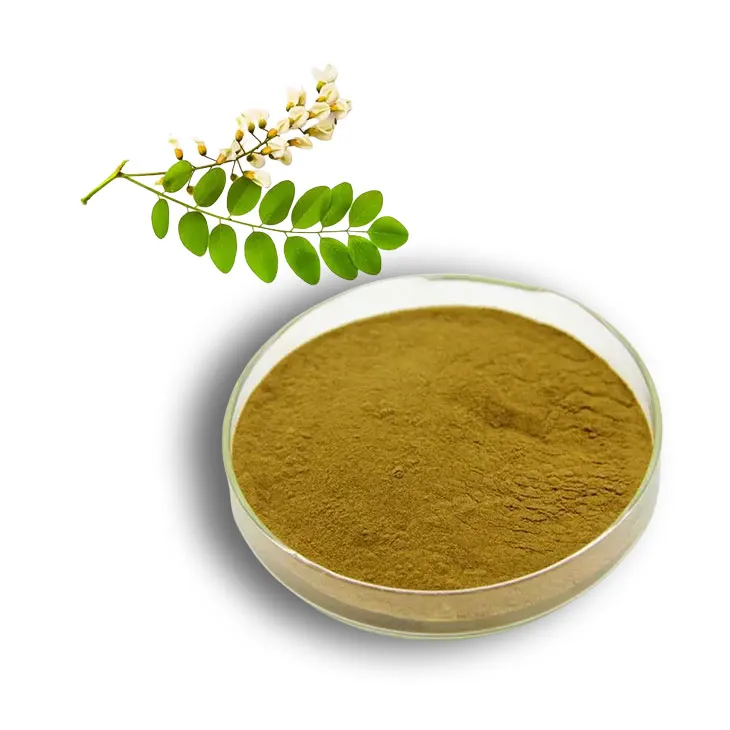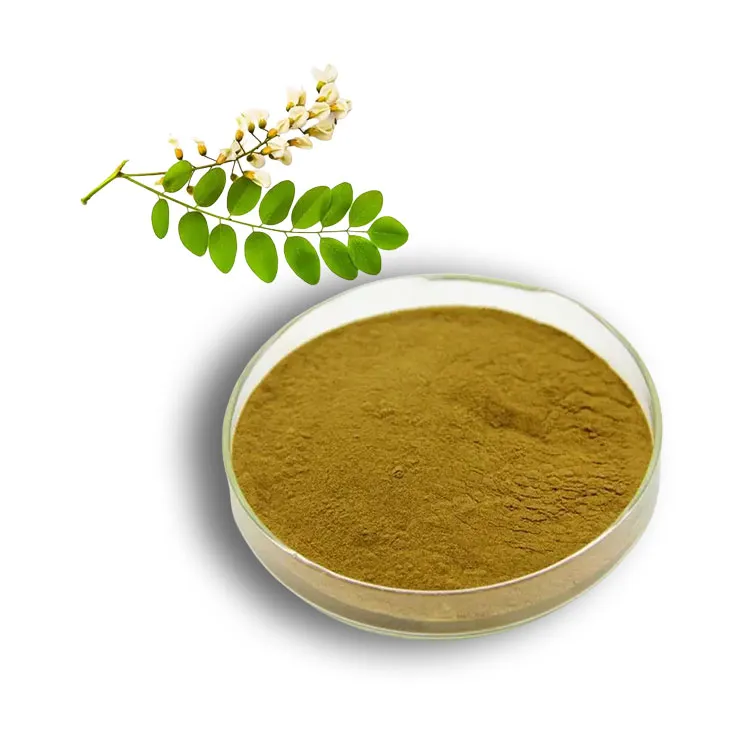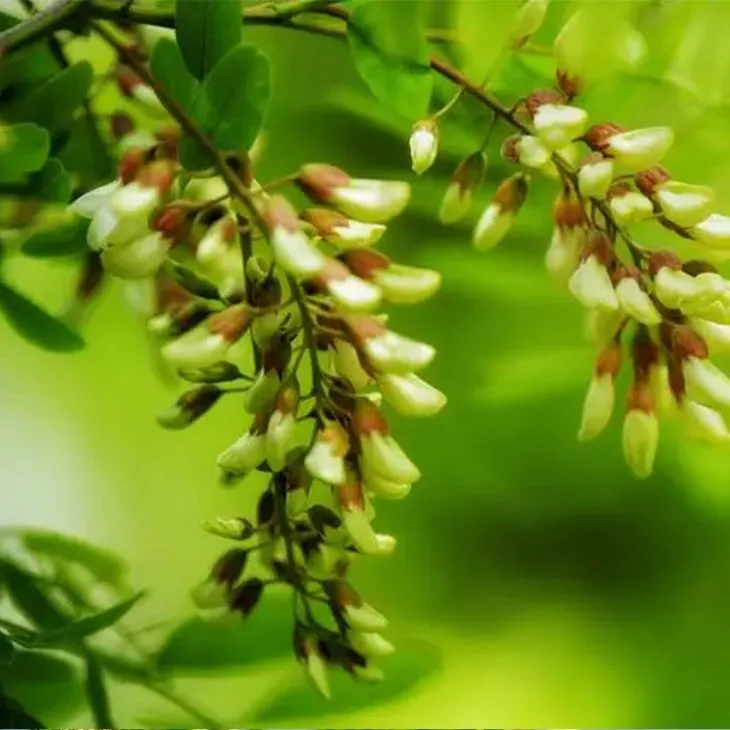- 0086-571-85302990
- sales@greenskybio.com
Sophora japonica flower extract of the best quality.
2024-12-02

1. Introduction to Sophora Japonica Flower Extract
The best - quality Sophora japonica flower extract is a natural product that has attracted significant attention in various fields. Derived from the flowers of the Sophora japonica tree, it holds a plethora of properties that make it highly valuable.

2. Cultivation of Sophora japonica Trees for High - Quality Extract
The journey towards obtaining the best - quality Sophora japonica flower extract begins with the cultivation of the Sophora japonica trees.
2.1 Sunlight Requirement
Adequate sunlight is crucial for the growth of Sophora japonica trees. These trees thrive in areas where they can receive sufficient sunlight throughout the day. Sunlight is essential for photosynthesis, the process by which plants convert carbon dioxide and water into organic compounds and oxygen. In the case of Sophora japonica trees, sufficient sunlight ensures the proper development of the flowers. It helps in the formation of the necessary biochemical compounds within the flowers, which are precursors to the active ingredients in the extract.
2.2 Soil Conditions
The soil in which Sophora japonica trees are planted also plays a vital role in determining the quality of the flowers. The soil should be well - drained, rich in nutrients, and have a suitable pH level. A well - drained soil prevents waterlogging, which can lead to root rot and other diseases. Nutrient - rich soil provides the necessary elements such as nitrogen, phosphorus, and potassium for the growth of the trees. The pH level of the soil affects the availability of these nutrients to the plants. For Sophora japonica, a slightly acidic to neutral pH range is often considered ideal. This optimal soil condition promotes healthy growth of the trees and the production of high - quality flowers.
2.3 Irrigation Practices
Careful irrigation is another important factor in the cultivation of Sophora japonica trees. Over - irrigation can lead to waterlogging, as mentioned earlier, while under - irrigation can cause stress to the plants. The amount and frequency of irrigation should be adjusted according to the climate, soil type, and growth stage of the trees. During the flowering stage, proper irrigation is particularly crucial to ensure that the flowers develop fully and retain their optimal quality. Appropriate irrigation helps in maintaining the turgidity of the plant cells, which is essential for the proper functioning of the flowers and the biosynthesis of the active ingredients.

3. The Significance of Enzymatic Extraction
When it comes to obtaining the best - quality Sophora japonica flower extract, the extraction technology employed is of utmost importance. Enzymatic extraction is an emerging and highly promising method.
3.1 Gentle Cell Wall Breakdown
Enzymes can break down the cell walls of the Sophora japonica flower more gently compared to traditional extraction methods. The cell wall of the flower contains various polysaccharides and other complex substances. Enzymes are able to specifically target and hydrolyze these components, creating small pores or openings in the cell wall. This gentle breakdown process is beneficial as it minimizes the damage to the internal components of the cell. It ensures that the active ingredients within the cell are not degraded or altered during the extraction process.
3.2 Complete Release of Active Ingredients
By breaking down the cell walls more effectively, enzymes can release the active ingredients more completely. The Sophora japonica flower contains a variety of bioactive compounds such as flavonoids, phenolic acids, and polysaccharides. These active ingredients are responsible for the various beneficial properties of the extract. With enzymatic extraction, a higher yield of these active ingredients can be achieved, resulting in a more potent and effective extract.

4. Applications in the Skincare Realm
The best - quality Sophora japonica flower extract has found extensive applications in the skincare industry.
4.1 Moisturizing Properties
The extract has excellent moisturizing properties. It can help to retain water in the skin, preventing it from becoming dry and flaky. The polysaccharides present in the extract form a thin, protective layer on the skin surface. This layer helps to trap moisture, keeping the skin hydrated for a longer period. This is especially beneficial for people with dry or sensitive skin.
4.2 Soothing Effects
It also has soothing effects on the skin. Skin irritation can be caused by various factors such as environmental pollutants, allergens, or harsh skincare products. The bioactive compounds in the Sophora japonica flower extract can calm the irritated skin. They can reduce redness, inflammation, and itching, providing relief to the skin. For example, the flavonoids in the extract have antioxidant and anti - inflammatory properties, which contribute to its soothing effects.
4.3 Skin Protection
Furthermore, the extract offers protection to the skin. It can act as a barrier against environmental stressors such as UV radiation, pollution, and free radicals. The phenolic acids in the extract have antioxidant properties, which can scavenge free radicals and prevent oxidative damage to the skin cells. By protecting the skin from these harmful factors, the Sophora japonica flower extract helps to maintain the health and integrity of the skin.
5. Applications in the Nutraceutical Area
In the nutraceutical area, the best - quality Sophora japonica flower extract also shows great potential.
5.1 Immune System Enhancement
One of the key health - promoting effects of the extract is its ability to enhance the immune system. The bioactive compounds present in the extract can stimulate the immune cells, such as macrophages and lymphocytes. These cells play important roles in the body's defense mechanism against pathogens. By enhancing the function of these immune cells, the Sophora japonica flower extract can help the body to better resist infections and diseases.
5.2 Other Potential Health Benefits
Besides immune system enhancement, the extract may also offer other potential health benefits. For instance, some studies suggest that it may have anti - diabetic properties. It could help in regulating blood sugar levels by improving insulin sensitivity. Additionally, it may have a positive impact on cardiovascular health. The flavonoids in the extract can help to reduce cholesterol levels and improve blood vessel function, thereby reducing the risk of heart diseases.
6. Applications in Herbal Medicine
The Sophora japonica flower extract is also a valuable ingredient in the field of herbal medicine.
6.1 Digestive Problem Remedies
It can be used in formulating remedies for digestive problems. The extract has properties that can help in improving digestion. For example, it may stimulate the secretion of digestive enzymes, which are necessary for the breakdown of food in the digestive tract. It can also soothe the digestive tract, reducing symptoms such as indigestion, bloating, and abdominal pain.
6.2 Other Disorders
In addition to digestive problems, the extract may also be used in the treatment of other disorders. In traditional medicine, it has been used for treating various ailments such as coughs, fevers, and inflammation. Some of the bioactive compounds in the extract have expectorant, antipyretic, and anti - inflammatory properties, which make it suitable for these applications.
7. Conclusion
In conclusion, the best - quality Sophora japonica flower extract is a remarkable natural product with multifaceted superiority. From its origin in carefully cultivated Sophora japonica trees to its extraction using advanced enzymatic methods, and its wide - ranging applications in skincare, nutraceuticals, and herbal medicine, it holds great promise. Continued research and development in this area are likely to uncover even more potential benefits and applications of this valuable natural extract.
FAQ:
Question 1: What are the key factors in cultivating Sophora japonica trees to ensure high - quality flower extract?
Adequate sunlight, proper soil conditions, and careful irrigation are the key factors. These elements contribute to the growth of high - quality Sophora japonica flowers, which is the first step in ensuring the quality of the flower extract.
Question 2: Why is enzymatic extraction considered a good method for obtaining high - quality Sophora Japonica Flower Extract?
Enzymatic extraction is a good method because enzymes can break down the cell walls of the flower more gently. This allows for a more complete release of the active ingredients, thus resulting in a high - quality extract.
Question 3: What are the benefits of Sophora Japonica Flower Extract in the skincare realm?
In the skincare realm, Sophora japonica flower extract can moisturize, soothe, and protect the skin.
Question 4: How does Sophora japonica flower extract contribute to health in the nutraceutical area?
In the nutraceutical area, it offers potential health - promoting effects such as enhancing the immune system.
Question 5: What role does Sophora japonica flower extract play in herbal medicine?
In the field of herbal medicine, it is a valuable ingredient for formulating remedies for digestive problems and other disorders.
Related literature
- Study on the Active Ingredients of Sophora japonica Flower Extract"
- "The Quality Control of Sophora japonica Flower Extract in Different Production Processes"
- "Beneficial Effects of Sophora japonica Flower Extract in Skincare and Health"
- ▶ Hesperidin
- ▶ Citrus Bioflavonoids
- ▶ Plant Extract
- ▶ lycopene
- ▶ Diosmin
- ▶ Grape seed extract
- ▶ Sea buckthorn Juice Powder
- ▶ Fruit Juice Powder
- ▶ Hops Extract
- ▶ Artichoke Extract
- ▶ Mushroom extract
- ▶ Astaxanthin
- ▶ Green Tea Extract
- ▶ Curcumin
- ▶ Horse Chestnut Extract
- ▶ Other Product
- ▶ Boswellia Serrata Extract
- ▶ Resveratrol
- ▶ Marigold Extract
- ▶ Grape Leaf Extract
- ▶ New Product
- ▶ Aminolevulinic acid
- ▶ Cranberry Extract
- ▶ Red Yeast Rice
- ▶ Red Wine Extract
-
Giant Knotweed Extract
2024-12-02
-
Avocado Extract Powder
2024-12-02
-
Pomegranate Extract
2024-12-02
-
Acerola Extract
2024-12-02
-
Lavender Extract
2024-12-02
-
Black Rice Extract
2024-12-02
-
Citrus Aurantii Extract
2024-12-02
-
Echinacea Extract
2024-12-02
-
Eyebright Extract
2024-12-02
-
Sophora Japonica Flower Extract
2024-12-02




















